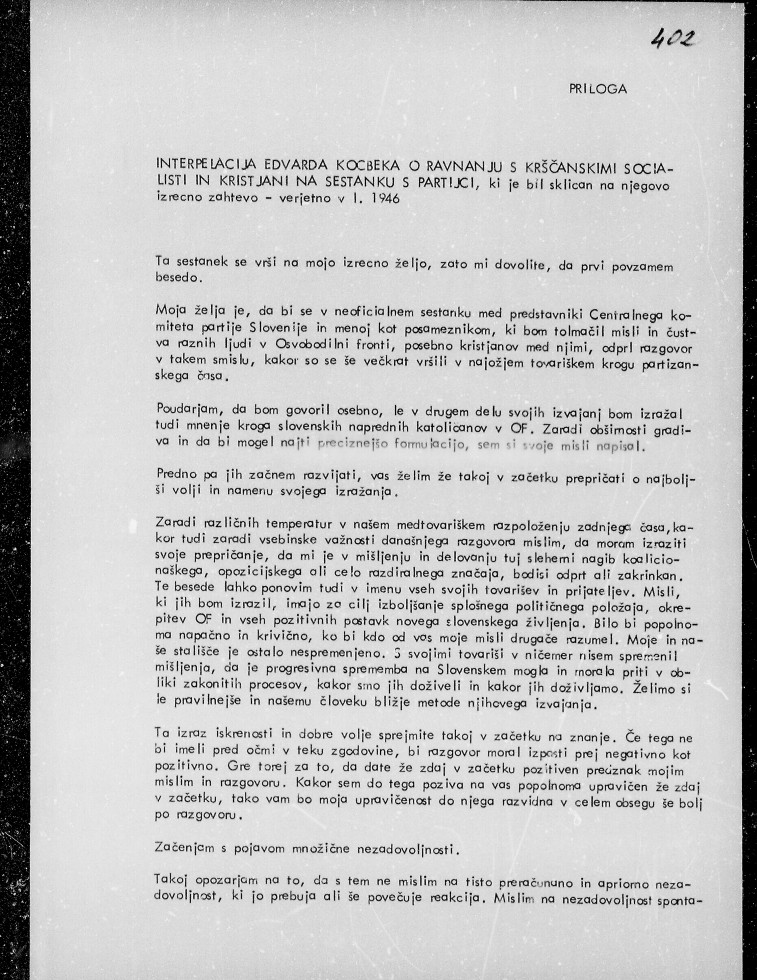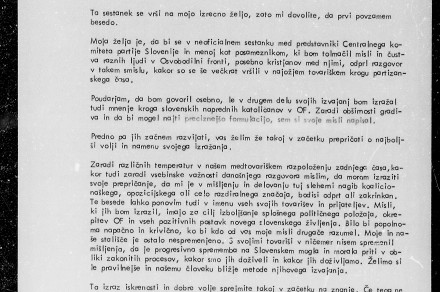Edvard Kocbek's Interpellation
Draft of the Speech delivered by Edvard Kocbek at the Meeting with the Representatives of the Leadership of the Communist Party of Slovenia in October 1946
At the start of December 1979, internal affairs authorities decided it was time to take action against the »hostile« attitude demonstrated by Vinko Ošlak in his public appearances. They searched his home and reported their findings to the Republic Council for the Protection of the Constitutional Order. Also reported was the political view of Ošlak, whose behaviour at that time appears quite brave looking at it from today's perspective.
The main find of the investigation was a typescript titled Edvard Kocbek’s Interpellation on Treating Christian Socialist and Christians Presented at the Meeting with the Communist Party Leadership. Judging from the accompanying report, the original study, kept by Kocbek, did not have a title; the title on the confiscated document was believed to be added by Ošlak. Prior to being sent to the Council for the Protection of the Constitutional Order, the document had apparently been retyped by the Analysis Department staff and this is the copy preserved in our archival fonds SI AS 1931. The original text as such has also been published before (for example in 1993 in Peter Kovačič – Peršin’s Osvobodilni spisi II).
When found in 1979, the document was, undoubtedly, of great importance for authorities charged with protecting the then constitutional order. It is obvious that there was some concern as to the damaging effect of this document being published by Kocbek or any other member of intelligentsia with whom he kept in touch. Publicly disclosing such a text at that time would most certainly add to challenges posed to the Communist Party by Kocbek throughout the 1970s (most of all with his 1975 interview in which he condemned post-war killings). Measures taken against him and those who shared his opinions have already been discussed in detail in topic-related literature.
Despite having considerable importance in the 1970s, the document is especially interesting when viewed within the time frame of its creation. Namely, it was a draft of the speech delivered by Edvard Kocbek before the members of the Central Committee of the Communist Party of Slovenia on October 4, 1946. Held at the premises of the Executive Board of the Liberation Front, the meeting was attended by Miha Marinko, Lidija Šentjurc, Boris Kraigher and Stane Kavčič, as well as Josip Vidmar, Marijan Brecelj and Tone Fajfar. The following day (the meeting took a bit longer than expected) they had a discussion. The conditions surrounding the meeting were as follows: after returning from Belgrade in February 1946 (were he was the Minister for Slovenia), Kocbek found himself in a role of a man on the fringe of the new power. Although he was the vice-president of the Presidium of the People’s Assembly of the People’s Republic of Slovenia and the vice-president of the Executive Board of the Liberation Front, his high ranking posts were only titular; they did not carry any real political power. The power, though, was concentrated elsewhere. At Kocbek’s request, a meeting took place between him and a number of post-war revolutionary politicians on October 4, 1946.
His “interpellation” is important for at least two reasons. First, it is a revealing critical assessment of the first post-war year and clearly reflects the characteristics of that time: among other things it points out the discontent of the people in view of the unknown fate of the Home Guard members returned from Carinthia (based on the 1975 testimony it was on October 5, 1946 that Kocbek first asked the leaders of the Party about the post-war killings); then there was a major role of the secret police and frequent abuses of power; the sense of the lack of freedom and passivity among people; the process of economic recovery and nationalization of assets (here Kocbek opposed the method used and not the actual process of nationalization); the Party taking all the power and being so exclusive in exercising such power; atheistic attitude of the authorities which surpassed anti-clericalism; pushing former colleagues (Christian Socialists) away from having any kind of influence in the society and matters of the state.
But most of all, the text bears witness to Kocbek’s post-war separation from the leadership of the Slovenian Communist Party. It points out irreconcilable differences in the vision of the former “comrades” about how the society should develop. Eventually this led to complete removal of Kocbek from all aspects of public life. Nevertheless, one thing became clear already in October 1946; the revolution conducted by the Communist Party within the first post-war year was not the revolution Edvard Kocbek envisioned and wanted.
Tadej Cankar



